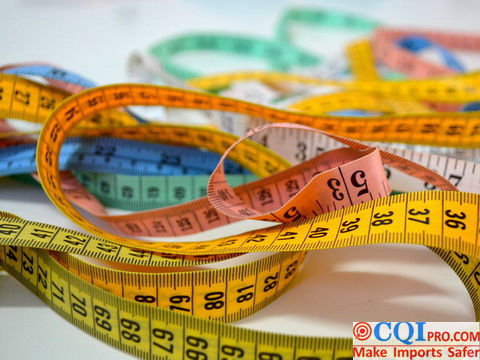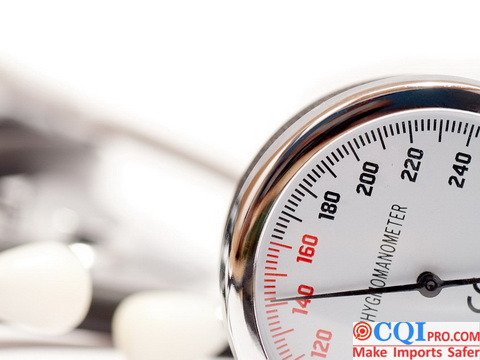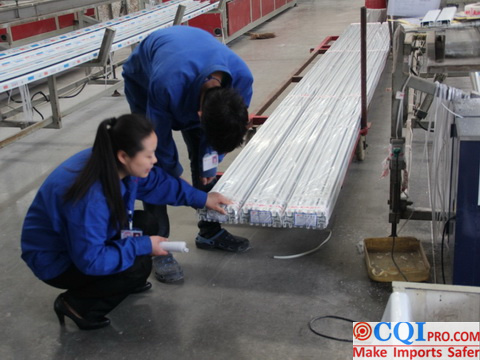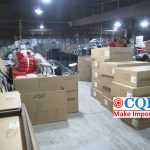Factory Quality Inspection Cannot Replace The Third Party.
With the improvement of domestic and foreign consumption levels and the change in business models of enterprises, the demand for inspection at home and abroad has risen and increased in order to promote sustainable development and improve product quality. Many importers also realize that product inspection plays a very important role in controlling product quality to a certain extent. It is not just because we provide inspection services that we are pushing the importance of product quality. Rather, we want to analyze the negative and positive effects of product quality from the root and give importers from all over the world some references to avoid unnecessary losses.
In this article, we would like to discuss the significance of product inspection and why CQL believes that internal quality inspection, which is preferred by many importers, cannot replace third-party quality inspection. Of course, this is a fact that CQI has witnessed with its own eyes after visiting hundreds of factories to inspect them!
Why do products need quality control?
There is no such thing as perfect quality in products,whether they are made by machine or by hand. In particular, the lower the cost of the product is, the greater the potential quality risk will be. This is because product quality involves many aspects, such as the choice of raw materials, the level of production equipment, the production process, the quality management of the factory, etc.From a more professional point of view, the quality control of a product is mainly to check whether the appearance of the product meets the requirements, and secondly, whether the product functions meet the national and industry standards. Before quality control, we also need to be familiar with the production process of the product and find out the potential appearance and functional quality problems from the QA point of view. At the same time, we must inspect the product from the consumer’s point of view, so as not to overlook some quality and functional blind spots, and help e-commerce clients reduce the generation of bad reviews.
Factory Quality Inspection, Unsolvable Problems
Product quality inspection can effectively promote the improvement of the enterprise quality management system.At the same time increase the economic benefits of enterprises and improve market competitiveness. What is more important is to improve the international trade of this transnational supply chain, after all, the basis of a stable supply chain is to ensure product quality, the subsequent expansion of sales categories, to occupy a larger market in their countries and even multi-national retail giants.

Improve product quality
Product quality control enables factories to identify process problems in the manufacturing of their products.Continually refine and improve their processes to ensure sustainable and high quality development. CQI has witnessed too many factories improve their quality, from refusing to inspect, to discovering batch problems that even the factory didn’t notice, to achieving impeccable quality, CQI and the factory progress together, with the goal of giving the importer a better product and maintaining a long-term relationship.
Due to the continuous improvement in product quality, the brands operated by importers will also be recognized by buyers or consumers in the industry, thus increasing client orders. This is because many quality-conscious buyers will conduct thorough inspections in their own warehouses while receiving large shipments in order to ensure that consumer satisfaction is maintained. It is not difficult to maintain an upward trend in consumer satisfaction after three tests: internal factory quality inspection, third-party quality inspection and purchaser’s internal quality inspection.
Due to the strict management of product quality, factories are constantly perfecting and improving production problems, reducing the rate of rejects and defective products, thus reducing the factory’s production costs and human resources. On the contrary, from the importer’s point of view, if the rate of defective goods is decreasing, then on the one hand, they have more confidence in the quality of the factory, and on the other hand, they can reduce their own losses to a certain extent.
Improve enterprise market competitiveness
Market competitiveness is based on an importer’s ability to not only have comprehensive marketing resources, but also to use product quality control to develop a marketing plan that is different from that of its peers in terms of creating value for consumers. This means that improving product quality and service quality can help importers achieve their own value, thus building their brand image and core competitiveness.
Present Situation Of Factory Quality Inspection
In recent years, many small and medium-sized factories have established quality management awareness, but in the process of quality management development, many problems still exist and directly hinder the improvement of factory product quality and service, which seriously affects the development of enterprises. The following are the main influencing factors:
Weak quality awareness of all staff
In the case of a factory, every member of the factory staff has a greater or lesser degree of involvement in the quality of the product, because the product depends on their participation. Among the factors that determine the quality of a product, the human factor ranks first and plays the most basic and important role. Therefore, quality management requires the active participation of all employees, and the quality of the product depends on the quality awareness of the factory personnel. From CQI’s experience in inspecting various factories, it is clear that in many factories the quality awareness of the personnel is weak, except for the higher management, but it is these personnel who are the key to achieving product quality. During CQI’s inspections, technicians and operators were found to have a limited understanding of the quality management system, and their limited expertise directly impacted product quality. How much better can we expect them to oversee the production of quality goods?
Deviation from quality certification
In today’s fierce market environment, obtaining a quality management system certification for a process is almost a basic threshold for a factory to participate in the market. As a result, many factory leaders place great importance on quality certification. However, this emphasis is often on the results of the certification rather than on the entire production process. The fact that a factory has received a quality certification simply means that the company has the ability to ensure the quality of its production, but it does not guarantee that the company’s products will fully meet the needs of importers. So many smart importers will arrange comprehensive factory audit to make sure that the production capacity of the factory is in accordance with the certificate and that the actual quality management is rigorous.
Inadequate quality management level
Factory leaders generally fall into two categories. One type is the giant who focuses on one product area and wants to be extreme in that area. The other group is involved in multiple product areas, but often these are the types of factories with poor quality management. Because they like to make quick money and focus on popular products, they will spare no effort to outsource the production of their products even if they do not have the production capacity of the product themselves. This leads to uneven product quality and no way to control the production process. This, of course, excludes the perfect quality management of large factories, which have the financial resources to purchase high-end raw materials and management personnel.
Why do importers need third-party inspection?
A third-party inspection agency, also known as a fair inspection, refers to an object other than two interconnected subjects and is called a third party. The third-party inspection organization finds problems from the perspective of professional inspectors according to national or industry standards, client requirements, etc.Works with national standards, industry content and client requirements to control product quality. At the same time, to a certain extent, it helps importers to supervise factories and improve product quality, which ultimately aims to increase market trust and establish their own brand effect.

With the development of the Internet in recent years, e-commerce sites such as Amazon have also developed rapidly, and their strong competitiveness has created a situation of survival of the fittest. There is no doubt that the operation of Amazon can not do without product quality, product quality is directly to the consumer, the quality of the product is the guarantee of reputation which is also the added value of the product. But the reality is cruel, a single bad review on Amazon can lead to a dramatic drop in the sales of the product. It can be said that without quality, there is no sales, no benefit, no development. In such a competitive environment, there are many Amazon sellers who don’t even have their own warehouses. After importing from China, the products are put into Amazon warehouse and shipped by Amazon warehouse. Under such sales conditions, how to achieve their product quality assurance is a question that every e-commerce seller needs to think about constantly.
In such an environment, the third-party inspection company platform is like a lifeline for every e-commerce business. It helps merchants to control the risk of their products and conduct sample testing according to national standards or client requirements. According to the test results to assess the quality of the whole batch of goods, to put forward relevant improvement suggestions to the factory, and issued a third-party inspection report, the importer through the inspection report to understand the quality of their imported products. With the endorsement of the third-party inspection company’s professional competence, the importer has a certain understanding of the quality of the whole batch of products, and can reduce the risk even in the case of consignment.
Reasons For Incomplete Factory Quality Inspection
As in the factory situation described above, although more and more factories are becoming quality conscious, the quality management system is still weak. In the current state of factory quality management, the importer’s reliance on internal factory inspections alone poses the following risks.
Quality control in a factory requires the involvement of multiple departments and positions. For example, the incoming inspection process for raw materials requires the involvement of four different functional departments. Under normal circumstances, there is a detailed division of labor between departments. But when the division of labor is unclear or there are errors in communication between the responsible persons, the whole process will go wrong, ultimately affecting product quality. Eventually, the quality of the product will be affected. The factory personnel may even shirk their responsibilities to each other, and the otherwise efficient production management may be interrupted, putting the factory’s solidarity to a great challenge.
Total quality management of the manufacturing process has become a production philosophy in almost every factory. In actual practice, it seems to be more difficult to do so. In the current state of factories, it is difficult to improve the quality of the manufacturing process due to factors such as the quality of factory staff, factory management, and the cost of each part of the process. Many factories rely on customer complaints to improve quality. Of course, factories that can do this can also become part of the importer’s supply chain management system.
Many fast-fashion brands have fewer styles and fewer numbers, and their product designs are updated quickly, so there is a situation where the product design process only focuses on efficiency and ignores quality itself. If quality control is relaxed in the design process, it will be too late for quality control later. Therefore, an experienced importer will entrust a third party to perform quality control, including the selection of raw materials and production processes, at the product design stage. Some designers only consider the problem from the design point of view, but it is still risky from the professional technical point of view.Without the third-party quality control, it is irreversible to cause huge losses after mass production.
Nowadays, multiple standards for product quality have emerged in many exporting factories. If the quality requirements of the products sold to Europe and America are high, they will be strictly controlled. The requirements for exporting to countries like South Africa are lower. So it is possible to produce two quality levels of products at the same price, which obviously will damage the interests of many importers. It may even affect the production of high quality products, because after all, the workers cannot operate multiple standard processes at the same time.
Take advantage of third-party inspection companies
The third-party inspection company acts as the client’s agent and controls the quality of the entire batch from the client’s point of view. At the same time, the third-party inspection company’s inspection gives a certain pressure on the factory’s production, which will virtually play a certain regulatory role. During the inspection process, the third-party inspection company will put forward some product improvement suggestions to the factory to improve product quality awareness.
In the case of a French client of CQI Inspection, for example, it was discovered that the disposable tableware was not properly assembled, and that there were problems with wrong packing and missing pieces in batches. The client asked CQI Inspections to the factory to inspect the products and set specific priorities based on the his problems. After the inspectors arrived at the factory, they found that the factory had loose management, high worker turnover and low product quality. Under the pressure of third-party inspection, the factory strengthened the management of factory employees, solved the problem of wrong packing and missing pieces, and actively improved product quality.
Product quality is determined by many factors in production, including personnel, machinery, raw materials, etc. Each of these factors can have a fatal impact on the final product quality. During the third-party inspection process, problems are reported back to management with suggestions for improvement. Based on the inspection report, the client will ask the factory to improve, pick or rework the product to avoid receiving defective products and suffering losses.
CQI Inspections was commissioned by a client from Brezil to inspect the products of a medium and small-sized furniture factory in Zhangzhou. The first time we visited the factory, the quality of the product was unsatisfactory and there were various batch problems as if the product was second-hand. With a sense of responsibility to the client, CLI Inspections not only identified product quality problems, but also made recommendations to the management for improvement, which were well accepted by the factory. After five years of working with the factory, the quality of the products has been improved greatly. Not only the client gets a higher quality product with the same money, but the factory has also strengthened quality management system and sales are getting better.
Many importers do not have a local office.Distance and communication problems make it impossible to verify product quality in person. If the quality of the product is not confirmed before it is shipped, there may be doubts about doing business with the factory when the goods arrive at the destination port. By entrusting product quality control to a third party, the importer will find that the third party can save on travel costs and hassle, despite the extra cost of inspection. Moreover, the third party is more professional and many problems that cannot be found in the factory can be found by the third party. After all, there is a big difference between the production and the use perspective.

In today’s environment, quality is fundamental to the survival and development of importers. Controlling the quality of products requires every importer and factory to establish a quality consciousness and constantly improving product quality is the trend of the market today. As quality is becoming more important to consumers, the Chinese government is also improving standards to ensure the sustainable development of import and export trade and to stabilize the position as a “world manufacturing power”.
This article discusses the current situation of factory quality management from the perspective of relying only on factory quality control and the advantages of third-party inspection, hoping that importers can realize the significance and value of implementing third-party quality inspection. Because it can not only promote the perfection and improvement of factory product quality, but also help importers improve their market competitiveness and promote the sustainable development of their enterprises while promoting international economic and trade activities. This will be the common expectation of foreign trader!
CQI5 is committed to providing importers worldwide with product quality inspection services that far exceed those of our peers. If you are planning to import or have imported from China or Southeast Asian countries, please contact us cs’@’cqipro.com to learn more about how we can make your imports safer.
This article is an original article for CQI Inspection, who is committed to providing high-quality product inspection technology and know-how sharing for global importers and retailers to make imports safer.
All rights reserved. The contents of this website provided by CQI Inspection may not be reproduced or used without express permission.
For reprint, please contact with CQI Inspection, thank you.





